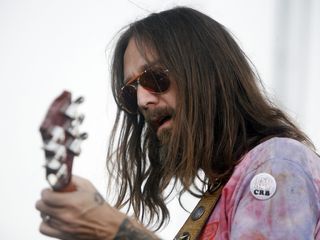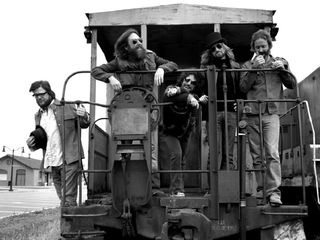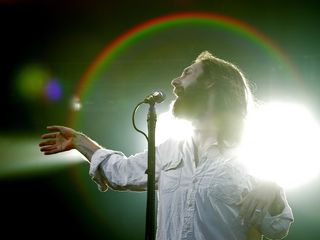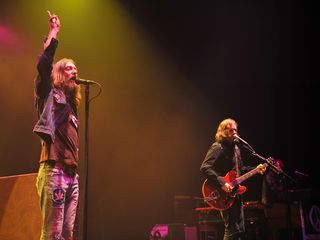
Chris Robinson talks CRB, prog, the Dead and the Black Crowes' future
Although his name is an unmistakable part of the band's moniker, Chris Robinson doesn't see himself as the leader of the Chris Robinson Brotherhood. "I'm like the guy who says, ‘Hey, let’s go over here,' or 'Hey, why don't we try this?'" he explains. "But if everybody is in tune with one another and is communicating well, I don’t really have to tell anybody what to do or what to play. The kind of musical expression we’re after is something I want us all to find collectively."
As the five-piece group (which also includes guitarist Neal Casal, keyboardist Adam MacDougall, drummer George Sluppick and bassist Mark Dutton) prepares to release their third studio album, Phosphorescent Harvest, on April 29, Robinson sat down with MusicRadar to talk about how the CRB operates, his expanding role as a guitarist, how old-school prog fits in the mix and when he might reunite with his brother Rich Robinson in the Black Crowes.
The Black Crowes have been together for so long, so I imagine there’s a feeling of novelty for you with the CRB. Are you still in the honeymoon phase with these guys?
“You know, we’re all a little long in the tooth. [Laughs] It’s not that this band is a trophy wife or anything like that, though. Like anything, time dictates another circumstance to deal with. I look at it as being a blessed event. After you’ve been doing this for so long, there’s this other thing, you know? So much of it is luck. There’s so many talented people who didn’t get to have this life. It’s tough, too. It’s a hard commitment. I’m never not humble that I get to do this, that I get recognition. I mean, who falls into this at this point in their life?
“And then there’s my relationship with Neal Casal. He’s always been a great guitarist, but in these last three years he’s becoming a more renowned guitarist. His guitar playing is becoming deeper and more dynamic, more expressive. Adam MacDougall, who is an amazing keyboardist, and whom I asked to be in the Black Crowes, now he has his own voice in this band.
“We’re free to do this band the way we want. I love that. We’re doing this on our own, and we have the poetic license to already call it a victory. We’re free. We don’t have to operate with any corporate mandate or profit-margin loss – whatever the fuck that language is. [Laughs] We can say yes to what we want, no to what we want. We know our music isn’t going to be played on radio stations or TV, so why should we not be as expressive as we can? That’s why our songs are eight minutes, or when we play live they’re 20 minutes. This isn’t for the John Mayer fans. If that’s what you’re into, this is not gonna be your trip.” [Laughs]

On playing guitar in the Chris Robinson Brotherhood
You’re playing a lot of guitar in the band. Is this something you wanted to do in the Black Crowes?
“Yeah, that’s the other part of this. I played guitar in my solo incarnation, in New Earth Mud, but now I get to go deeper into it. There’s not a lot of space in the Black Crowes for me to play guitar. But as that band morphs into whatever it’s going to be, I’m still writing songs all the time, so that’s like my blind-person-crawling-across-the-floor reality.
“I work hard at the guitar, but I know my limitations. One of the lucky things for me is that I didn’t sit in my room playing Eric Clapton and Jimmy Page. My influences are really different and weird, so they have nothing to do with the mechanics of the guitar. I work at the guitar and I spend time on it. The reality is, we get to play for four hours a day; you do 120 shows a year, you’re bound to get better at it. That doesn’t include sitting around backstage playing, doing stuff on the bus or in rehearsal. I won’t ever play as well as Neal, but I can still have my fever on the space station vibe.”
How do you work with Neal on divvying up guitar duties?
“I’m usually the plucky, rhythm-y person. My style is chaotic. Neal is more of the melodic, structured, Zen-like guitarist. With my playing, people have said, ‘You’re the only person who actually sounds like Syd Barrett did on his records.’ [Laughs] That’s cool with me – Syd Barrett in a folk-rock band. But you put my loose, disorganized thing with what Neal does, and it works ‘cause it’s musical. Our ears are attuned to our sound and what we’re doing.
“To me, it would be so boring and uninteresting to go out there and play the same solo the same way night after night. I know some people are proud of themselves when they can pull off that feat. I see them saying, ‘Thank you! Look at me. Worship me.’ That’s not for me. I’m fine for being a fringe element.”
The song Shore Power is set to a boogie-woogie rhythm, but there’s also some cosmic sounds that seem like they’re coming from old synths. That’s a great dichotomy.
“Cool, yeah. I think a fair amount of my writing is earthbound; there’s a dusty, wagon-wheel element to it. But we wanted to sugarcoat that in a more cosmic electronic glaze, sort of a Herbie Hancock Mwandishi-era synthed-out place, or almost a Bernie Worrell thing. That’s Adam’s thing. We’re putting our love of outer space and McCabe & Mrs. Miller in one sound.”

Loving prog rock
I can’t believe you referenced McCabe & Mrs. Miller. Not may people bring up Robert Altman – at all.
“Robert Altman, man – aesthetically, that’s where we are. If my next band were a Robert Altman film, it would be Images. I got to smoke a joint with Robert Altman once. That’s well on my list of the coolest things I ever got to do. The Long Goodbye is one of the coolest films about Los Angeles ever made. He had a few clunkers, but for the most part Altman was rad.”
The song About A Stranger sounds as if it could have come from the Grateful Dead.
“Totally. The GDs run right through us. Neal and I are huge, unashamed Grateful Dead fans. I think the big difference between us and other Deadheads, the garden variety-type, is that they only listen to the Dead, whereas I have 8,000 records in my house. I have all the Grateful Dead records, and I have thousands of shows, but I also have tons of other stuff.
“I take any kind of comparison between us and the Dead as a huge compliment. As an influence and inspiration, Jerry looms over a lot of us. As times go by, we forget about that core energy and musicality that he and the band had. It’s not nostalgic, either – he still rings true.”
You guys get a little proggy in the song Clear Blue Skies. Where does that come from?
“Well, everybody has to deal with my interests on the bus. I’m not exactly a fascist when it comes to playing music, but I do like to play certain stuff. Nobody’s complained yet. [Laughs] We’re really into mid-Century avant-garde electronic composition, and that got me into other electronic music. Nothing on the dance end of it, though. Julian House has this label in England called Ghost Box – lots of cool spaces being investigated. That and progressive music, too.”
What kind of progressive music are we talking?
“I'm into the English prog stuff. We’ll have some Gentle Giant jams on the bus. I’m a huge fan of the first Van der Graaf Generator record, as well. That’s a little more psych. Bands like The Canterbury Scene and Nektar and those kinds of groups, we’re into that stuff. The Nice was cool. I like progressive music when it’s more psychedelic; when it got more classical, not as much. I think Yes is a different animal. They could play all of this complicated, classically composed architecture, but then they could also have these super-pop melodies. There was a Beatles meets West Coast thing going on there. Yes were more of a pop band and not so much a prog band.”

Chris Robinson talks CRB, prog, the Dead and the Black Crowes' future
Above: Chris on stage with brother Rich Robinson during a Black Crowes performance in New York City, 2008.
What’s the status of the Black Crowes. Do you know when the band might pick up again?
[Sighs] “I don’t know… When I’m not dealing with something, I don’t really deal. [Laughs] Everyone wanted to do the Black Crowes last year, so we did it. We had a grand old time, saw a lot of old friends and made some new ones. I feel good about it, and that’s as far as I’ll go with it until something in the wind changes.”
What is it about brothers in bands? The Kinks, The Everly Brothers, Oasis, Creedence – it’s always such a hard dynamic, isn’t it? Have you ever talked to –
“A psychiatrist?” [Laughs]
No, I was going to say another musician who has a brother in his band.
“Well, I’ve known the Gallagher brothers for 13, 14 years. I don’t see them that often, but… I don’t know, man. Put it this way: It’s tough enough being family. Your parents fuck you up, school fucks you up – everything. And then you throw music onto it, and ambition and opinions and drive. And then you throw success in there, all the fame and money and fortune and ego. Very few families are built to deal with that kind of shit. It’s complicated.” [Laughs]
The Van Halen brothers never seem to fight with each other. It’s sort of like them against the world.
“Yeah, there’s them. AC/DC are that way, too, but they have to be because they’re small. [Laughs] They need to protect each other around the watering hole; one guy has to look out for the other one. But it’s a different thing in that band – it’s two guitarists. And in Van Halen it’s the guitarist and the drummer. With the Kinks and Oasis, it’s the singer and guitarist. And us. I guess it’s kind of like looking at yourself in the mirror. It’s a strange trip.
“As we dig deeper into the science and perceptions of the brain, we realize that everything is completely askew. It’s hard to have anybody look at something the way same. It can be relative things, obscure things, reality. The science of how we operate as weird mammals is deep. Throw being in a band into that, you know?”
The Chris Robinson Brotherhood's Phosphorescent Harvest can be pre-ordered on Amazon.

Joe is a freelance journalist who has, over the past few decades, interviewed hundreds of guitarists for Guitar World, Guitar Player, MusicRadar and Classic Rock. He is also a former editor of Guitar World, contributing writer for Guitar Aficionado and VP of A&R for Island Records. He’s an enthusiastic guitarist, but he’s nowhere near the likes of the people he interviews. Surprisingly, his skills are more suited to the drums. If you need a drummer for your Beatles tribute band, look him up.

“He's playing acoustic guitar, but a lot of it sounds like us. Ed really pushes himself”: Dani Filth on Cradle Of Filth's collaboration with… Ed Sheeran

“There was a minute in the ‘80s where I was just being a lunatic. I got it into my head that I should think more about music and I cut a demo with Toto”: Rob Lowe says that his wild antics led him to believe that he should consider a career in soft rock

“He's playing acoustic guitar, but a lot of it sounds like us. Ed really pushes himself”: Dani Filth on Cradle Of Filth's collaboration with… Ed Sheeran

“There was a minute in the ‘80s where I was just being a lunatic. I got it into my head that I should think more about music and I cut a demo with Toto”: Rob Lowe says that his wild antics led him to believe that he should consider a career in soft rock
Most Popular







